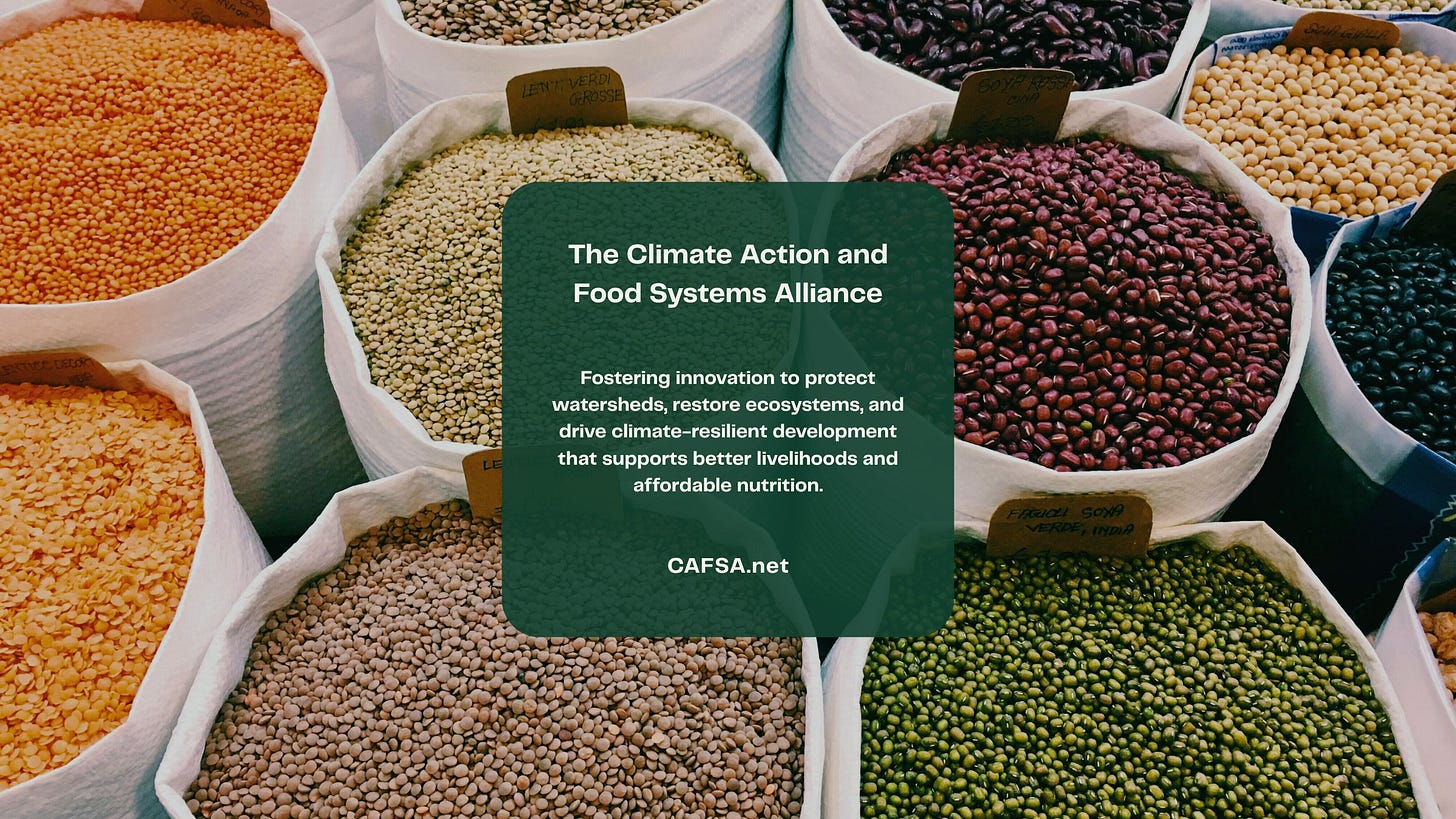Climate Action & Food Systems Alliance to support conservation, food security & development
CAFSA is convened by Climate Civics and GIFSEP, to connect networks of stakeholders, institutions & innovators, to build capacity, support strategies for climate-smart nutrition security.
The Climate Action and Food Systems Alliance (CAFSA.net) is a coalition of voices for climate-resilient food systems, convened by Climate Civics and the Global Initiative for Food Security and Ecosystem Preservation (GIFSEP). The Alliance will bring together local and global civil society organizations (CSOs), in Africa, the Americas, and around the world, with interest in upgrading everyday food system activities to better support a future of climate-resilient development, opportunity, and wellbeing for all.
Food systems depend on healthy ecosystems and watersheds, and therefore on the dynamics of Earth’s climate system. There is no food security without optimal climate conditions, and no climate stability without sustainble food systems. Meanwhile, the cost and risk associated with unsustainable practices is already out of control, and getting worse.
Financial regulators, analysts, and institutions consistently find that unchecked climate change will not only create costly temporary disruptions, but could permanently and irreversibly destabilize the entire financial system, and with it the mainstream economies of nation states.
The Food System Economics Commission has identified $138 trillion in traceable waste and cost from unsustainable practices, since the Paris Agreement was signed—9 years ago today.
The 2023 State of the Climate report warned that “By the end of this century, an estimated 3 to 6 billion individuals... might find themselves confined beyond the livable region, encountering severe heat, limited food availability, and elevated mortality rates because of the effects of climate change (Lenton et al. 2023).”
For these reasons, CAFSA will facilitate enhanced discussion of practical links between food systems and climate action, through partner networks. Key issues will include food-related finance innovation, data systems that translate science insights into everyday decision-making, and policy planning at regional and national levels. National policy planning includes the need for upgraded Nationally Determined Contributions to implementation of the Paris Agreement (NDC 3.0).
A core priority will be the Sharm el-Sheikh Joint Work on the Implementation of Climate Action on Agriculture and Food Security (SJWA). The SJWA was adopted during the COP27 round of United Nations Climate Change negotiations in Egypt, in 2022, with the aim of bridging the work of making food systems climate-resilent with the work of transforming economies through regenerative land use and development.
All of this can be supported by the Paris Agreement’s call to multilevel cooperation to accelerate both practical innovation and effective outcomes, as outlined in paragraph 8 of Article 6 of the Agreement. This makes CAFSA a clear Climate Value Exchange priority, and so we will manage CAFSA through this partnership platform. The Alliance will invite spontaneous constructive overlap between transformation-oriented coalitions.
Climate Civics Executive Director Joseph Robertson shared news of the Climate Action and Food Systems Alliance in a contribution to the Earth Day High-Level Meeting on Harmony with Nature and Living Well, held at United Nations Headquarters in New York.
Going forward, the Climate Action and Food Systems Alliance will build on the work of core partners and expand efforts to empower communities, provide new insights about the most relevant local opportunities for diversified climate-resilient development, and support participatory engagement with emerging sustainable finance platforms, like the Good Food Finance Facility and the Tropical Forests Forever Facility.
CAFSA recognizes, as does UNFCCC COP decision 3/CP27, that:
farmers, including smallholders and pastoralists, are stewards of the land and are inclined to apply sustainable land management approaches, and acknowledging that their vulnerability to climate change presents a challenge in fulfilling this important role and that policy responses in agriculture are more likely to succeed if they consider the role of farmers as key agents of change…
The Climate Action and Food Systems Alliance also recognizes the need for cooperation between cities and regions, to foster food system value chains that support better livelihoods, enhanced food security, affordable access to nutrition. In line with these aims, we will support innovations in data-systems, business model design and incubation, and capacity building.
CAFSA partners will convene meetings aimed at mapping vulnerability and designing strategies to protect watersheds and restore ecosystems. CAFSA aims to mobilize the Capital to Communities participatory approach to localizing financial innovation, while supporting development of resilience-building value chains, to create new opportunities for sustainable development through SMEs.




